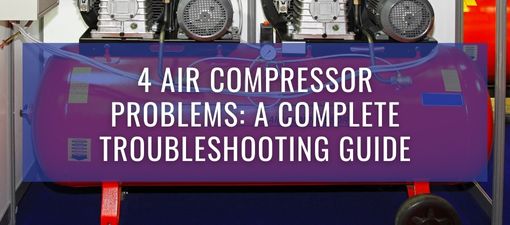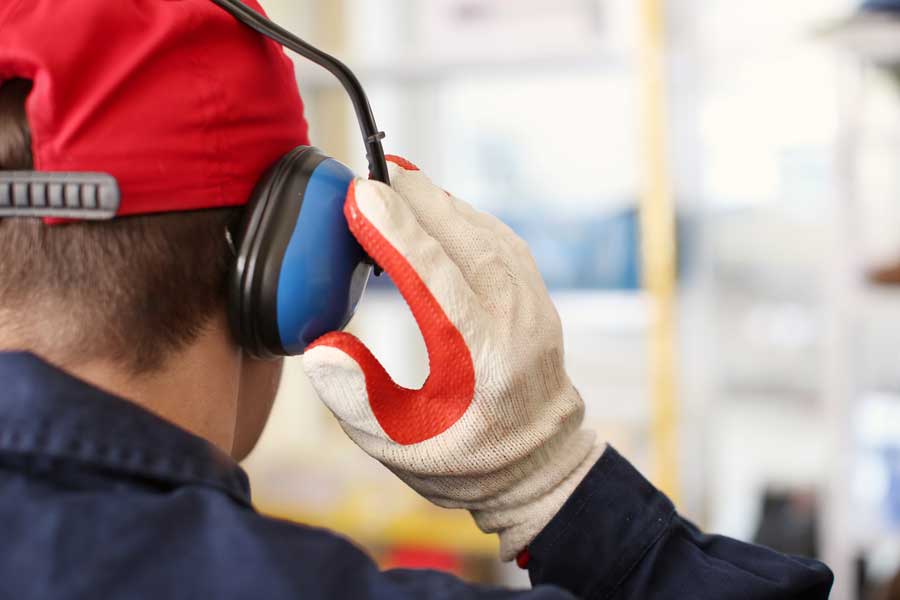
Air compressors are fantastic, dynamic machines that can perform many useful functions.
They can power air tools, pump up tires and other inflatables, power car painters, and much more.
But, like any machine, they are prone to problems from wear and tear.
Here at Air Power Equipment Company, we’ve identified BLANK common air compressor problems, what they mean, and how to give them a quick fix if possible.
As always, don’t hesitate to visit our website or give us a call if you need additional assistance. And if you’re interested in air compressors, we’re the place to look for them! We offer a wide range of small, large, stationary, and portable compressors to meet your needs!
| Contents |
|---|
 Air Intake Air Compressor Problems
Air Intake Air Compressor Problems
An air compressor pulls in air and builds up air pressure from its air intake valve. But sometimes, air can push back out of the valve, preventing the compressor from building pressure.
You can tell this happens if the compressor takes longer than usual to build pressure or you feel the air pushing out of the intake valve.
This issue can be pretty serious. It can overwork the compressor, causing overheating and early-onset wear and tear. When this happens, you know you have air compressor problems.
When this problem happens, it means your intake valve is broken or nearly broken.
The Solution
Do a quick search for spare parts. You’ll save some money if you can find spare parts online.
Then, remove the pump and replace the intake valve with your new parts.
Make sure you seal the parts together well to prevent air leaks. If you suspect an air leak, put some soap around the suspected area. Bubbles will appear where leaks are.
It’s quite a simple fix and doesn’t require breaking down the entire compressor, just a specific part of it.
Power Switch Issues
This problem is an easy one to spot. If your air compressor isn’t turning on, you know there’s something wrong and you have air compressor problems.
Of course, there can be other reasons your compressor isn’t starting.
To rule out some other potential problem causers, ensure you’re plugged into an outlet that works and drain your compressor of air.
Then, you need a multimeter check. First, unplug the compressor, and remove the panel where the power switch is. Next, plug the compressor into a reliable power source and use the multimeter probe to check if power reaches the switch (or if there isn’t a broken wire).
Then, check if power reaches the motor side across the switch. If you aren’t receiving power, then your switch is broken.
The Solution
Buy a replacement switch. They are relatively cheap and easy to find. In addition, many switches are compatible across multiple types of compressors.
Excessive Oil Issues
There are four common reasons why your compressor is experiencing oil carryover issues.
Oil issues can cause:
- Rapid heat buildup
- Oil droplets in the air
- Early damage to parts
1. Separator Filter Malfunction
Your compressor’s separator filter stops oil and air from combining in the compressor tank. Oil is necessary for lubrication and heat absorption.
When the filter breaks or becomes too permeated with oil over time, leaks occur, and air and oil mix.
The Solution
Replacing your separator filter is the best way to fix this problem.
2. Low Oil Levels
The oil absorbs heat in the compressor. But the less oil there is, the faster the oil heats up.
The Solution
Make sure you have plenty of oil! Check regularly, especially before and after usage.
3. Clogged Oil Return Line
An oil return line cycles oil back through the compressor. Sometimes, it can clog from dirt or other particles.
A clogged oil return line prevents oil cycling.
The air compressor problem’s Solution
Visit an air compressor service store. They’ll clean the oil return line for you.
4. Too Much Oil
Too little oil can be a problem, but too much oil can also be a problem. You need enough room for air and oil in your compressor. Too much oil prevents ample air from entering.
Too little air intake results in oil carryover into the discharge pipe. Your compressor can’t reuse this oil, so you end up wasting oil. Refilling oil can get expensive, so don’t overfill!
 Vibration Problems
Vibration Problems
An air compressor vibrates quite a bit when it fills up with air. It could loosen parts or break them outright if it vibrates too much.
Some parts of an air compressor are designed to reduce vibration, but they are susceptible to damage.
Here are some different reasons why your compressor may have vibration problems:
1. Mounting Bolts
If you have a fixed air compressor, like one mounted to a wall in your garage or maybe on the floor, it’s likely secured by mounting bolts.
Loose Mounting Bolts
If they are loose, which can happen over time, the compressor will have more room to vibrate. Even if one bolt is loose, it will cause more vibration.
The Solution
Tighten the bolts! You may have to do this every now and then. Make it a part of your regular maintenance routine.
Uneven Mounting Bolts
If a bolt was screwed in unevenly, then it won’t have a proper attachment to the stable ground.
The Solution
If you notice a bolt is uneven, unscrew the uneven bolt all the way, then screw it back in correctly. Have someone or something hold the compressor in place while the bolt is out to ensure it doesn’t fall.
Loose or Uneven Surface
Attaching your air compressor to a wall is usually a good idea. But if the wall is thin and moves around easily, it won’t make a suitable mounting place for your compressor.
The Solution
Consider where you have your compressor installed. You may have to move it if the surface isn’t stable enough. If it’s a fixed one, your compressor needs a tight, complete seal on whatever even, stable surface it’s attached to.
Rusty Mounting Brackets
Rust weakens the structural integrity of the metal brackets. Rust can also spread to other parts of the compressor. Mounting brackets are easily replaceable, so replace them if they’re rusty before it spreads.
2. Crankshaft
A crankshaft helps bring air into the compressor. Since it moves around in a circular motion, it is prone to vibrations.
A Bent Crankshaft
A bent crankshaft puts the compressor off balance. An off-balance compressor vibrates more than normal. Remove the compressor’s encasement to see if the crankshaft is bent. If so, it needs replacing.
A Rusty Crankshaft
Rust often grinds up against metal, causing vibrations and the deterioration of parts. Unfortunately, if rust has reached your crankshaft, it will likely spread to other, more integral parts of the compressor. As a result, you may need an all-out replacement.
3. Belts
Belts, much like an engine belt in a car, are critical to the overall function of the compressor.
Tight Belt
A tight belt can put too much tension on the internal parts of the compressor. If belt tightness is an issue, then the belt is too short. Simply swapping out for a longer belt will solve the problem.
Loose Belt
Conversely, a loose belt allows the parts to move around too much. Swap for a shorter belt to fix this problem. New compressors don’t usually have belt issues since they come straight from the factory.
Used compressors, where someone may have swapped with an off-fitting belt, are typically where belt issues come up.
In conclusion
Here at Air Power Equipment Company, we hope to have given you clarity about some common issues with air compressors, what they mean, and how to fix them. If you have any questions or an issue we didn’t address, feel free to give us a call or visit our website!
Air Power Equipment Company in Oklahoma City (OKC), is the leading source for new air compressor sales and used air compressor sales throughout the country. We specialize in rotary screw air compressor sales and reciprocal air compressor sales. Air Power Equipment Company is also the best source for air compressor service and air compressor parts in Oklahoma. If you are looking for new air compressors, used air compressors, air compressor parts, or air compressor problems call Air Power Equipment Company OKC. We are experts with all brands of air compressor equipment and we are a stocking distributor of air compressor brands like FS Curtis Air Compressors, Champion Air Compressors, Campbell Hausfeld Air Compressors, Kellogg Air Compressors, American Air Compressors, Quincy Compressor and many more. Call us at (405) 445-1216 – we have what you need, and at the best price you will find.
